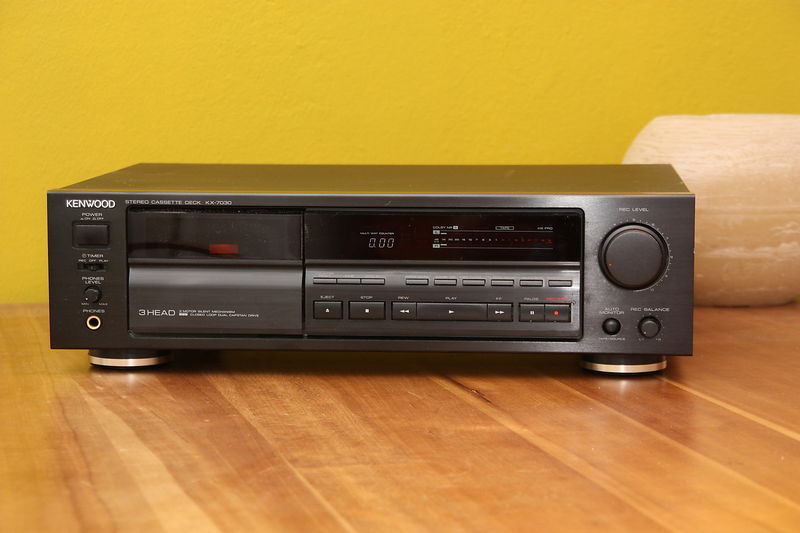Kenwood KX-7030
Data
General
- Manufacturer: Kenwood
- Model: KX-7030
- Type: Compact Cassette Tape Deck
- Type: Front loader
- Years of manufacture: 1991 - 1992
- Made in: Japan
- Color: Black
- Remote control: Yes
- Mains connection: 220 V / 50 Hz
- Power consumption: 24 W
- Dimensions: 440 x 127 x 324 mm (WxHxD)
- Weight: 5.1 kg
- Original price approx.: 598 DM
Technical Data
- HF premagnetization: 210 kHz
- Tone heads: 3 (A/W hard permalloy, erase head double gap ferrite)
- Motors: 3 electronically controlled DC rotors
- Synchronous fluctuations: 0.045 % (WRMS) / 0.1 % (DIN)
- Belt types: IEC Type I, II, IV
- Frequency response:
- Type I: 20 Hz - 18 kHz (+/- 3dB)
Type II: 20 Hz - 19 kHz (+/- 3dB) Type IV: 20 Hz - 20 kHz (+/- 3dB)
- Distortion factor: < 0.7 %
- Signal-to-noise ratio (Type IV):
- with Dolby C: 74 dB
- with Dolby B: 67 dB
- without Dolby : 59 dB
- Input sensitivity/impedance:
- Line RCA/RCA R/L = 77.5 mV / 50 kOhm.
- Output level/impedance:
- Line RCA/RCA R/L = 490 mV / 3 kOhm.
- Headphones 6.35 mm jack = 0.85 mW / 8 Ohm (with level control)
- Noise reduction Dolby B, C, dynamic extension HX-Pro
- Further data at "Hifi-Engine": [1]
Special Features
- 3 DC motors with silent mechanism
- Closed loop dual capstan drive
- Motor driven cassette eject
- Cassette ejection via infrared remote control (option)
- MPX filter
- Bias Preset button (pre-magnetization storage)
- Auto-Bias Fine Tuning (automatic pre-magnetization for the respective tape type)
- digital real time counter
- Display can be switched off
- Music track search (for fast-forwarding or rewinding up to 16 tracks)
- Repeat function (repeat a track)
Index Scan (track search) CD Peak Search (peak level search for CD recordings) Rewind with playback start
- Re-record standby (for re-recording from start point)
- Playback with fast rewind for empty sections
Headphone output with level control
- Timer switch for record/playback
- Remote control via Kenwood system bus
Remarks
- Other models in the same series:
- Kenwood KX-3030
- Kenwood KX-5030
- Kenwood KX-5530
- Kenwood KX-7030
- [[Predecessor model:
- KX-5010
- Successor model:
- Kenwood KX-7050 / Kenwood KX-7050 S
Pictures
- Picture: Kenwood KX-7030
- Picture from Kenwood catalog Hifi '91
Reports
- Report in "Audio" 02 / 1992
- The KX-7030 belongs to that generation - at the beginning of the nineties - where the production of good playback quality even in lightweight construction and by means of highly integrated circuits was well under control.
- I bought a KX-7030 myself some time ago, which must have almost broken down at the previous owner. It now runs flawlessly. The sound quality, which the deck originally offers, lies somewhere between a Sony TC-K 690 and TC-K 770. Which is already very satisfying in absolute terms.
- But I wouldn't call it a dragonkiller or the quality equivalent of a real top deck.
- It is an upper middle class deck and not a top class deck from that time.
If you know how to use a soldering iron, you can get a bit more playback quality out of the unit by replacing the numerous coupling electrolytic capacitors in the signal paths with e.g. Nichicon bipolars (the green ones, not expensive). The filter capacitors in the power supply branches should also be replaced. Replacing the ceramic capacitors with foil types of the same value will also have a positive effect. If you are still recording to tape, you should replace the NJM4565DD in the recording branch with an NJM2068DD. Which, however, requires a recalibration of the recording branch.
- Overall, a KX-7030 so revised then comes across as subtly better, smoother, with better resolution and contouring.
- My tapes recorded with a TC-K 770 are now sonically reproduced 1:1 by the KX-7030. Replacing the Toshiba opamp can be avoided if you increase the quality of the components around it a bit. Of course, provided that the azimuth is correct and the audio heads are demagnetized.
- see in this context also link, especially section synchronous fluctuations.
Links
- Product information in the "Kenwood Archive": [2]

